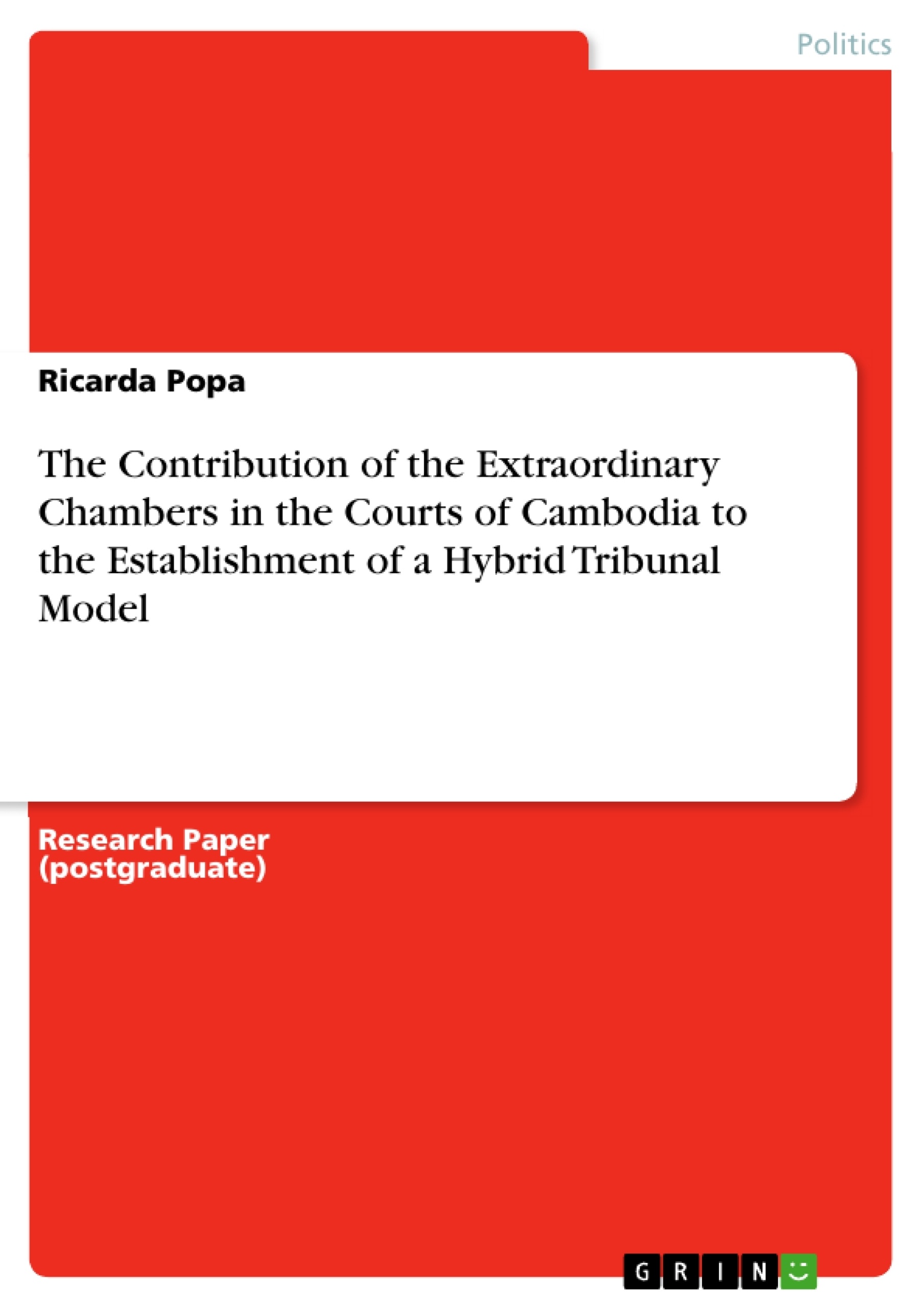This research paper exemplifies the contribution of the Extraordinary Chambers in the Courts of Cambodia (ECCC) to the establishment of a hybrid tribunal model as an instrument for prosecuting serious criminal offenses committed systematically during conflicts. The research sphere is demarcated by the world’s 3rd hybrid tribunal novelty, and its participation in the advancement of a hybrid tribunal model, as internationalized judicial instrument of correction of those atrocities against humanity that where committed methodically with political purposes in times of authoritarian regimes or armed conflicts of different origin. The interest arises from the awareness that by entering into force of the International Criminal Court in The Hague/ICC in 2002, a shift of significance has taken place from the international level back to the domestic one, in dealing with serious crimes. In the context of radical changes, the ECCC comes to strengthen the hybrid tribunal instrument as a judicial organization form with multidimensional benefits, and to offer it sustainability to the advantage of other post-conflict societies.
Inhaltsverzeichnis (Table of Contents)
- Transitional Justice and the Hybrid Tribunal Instrument.
- Transitional Justice.
- The Hybrid Tribunal.
- The Khmer Rouge and Transitional Justice in Cambodia.
- History of the Conflict.
- The Period after the Conflict.
- Transitional Justice Measures
- The ECCC.
- Historical Outline of its Establishment.
- Features of the ECCC.
- The Meaning of the ECCC to the Cambodian State and People.
- A Cambodian contribution to the hybrid tribunal instrument .
- Innovations in Relation to Other Hybrid Courts.
- Meaning to Other Post-Conflict States.
- The ECCC as a novel hybrid tribunal model.
- The ECCC's contribution to strengthening the hybrid tribunal instrument.
- The ECCC's significance for other post-conflict societies.
- The ECCC's complementarity with the ICC.
- The ECCC's unique features and challenges.
- Transitional Justice and the Hybrid Tribunal Instrument: This chapter introduces the concepts of transitional justice and hybrid tribunals, exploring their historical context and evolution. It examines the theoretical framework for understanding the role of hybrid tribunals in addressing past injustices and promoting reconciliation.
- The Khmer Rouge and Transitional Justice in Cambodia: This chapter provides a historical overview of the Khmer Rouge regime and the Cambodian conflict, highlighting the context of violence and human rights abuses. It explores the challenges of achieving transitional justice in Cambodia and the role of international actors in the process.
- The ECCC: This chapter focuses on the ECCC, its historical establishment, and its key features. It examines the legal framework of the tribunal, its structure, and its mandate. This chapter also discusses the ECCC's significance for the Cambodian state and people and its contribution to the advancement of international justice.
- A Cambodian Contribution to the Hybrid Tribunal Instrument: This chapter analyzes the ECCC's innovative aspects compared to other hybrid courts, highlighting its unique characteristics and the lessons it offers for other post-conflict societies. It explores the potential of the ECCC model for addressing challenges faced by emerging democracies in dealing with past atrocities.
Zielsetzung und Themenschwerpunkte (Objectives and Key Themes)
This research paper examines the role of the Extraordinary Chambers in the Courts of Cambodia (ECCC) in establishing the hybrid tribunal model as a means of prosecuting serious criminal offences committed systematically during conflicts. The paper focuses on the ECCC's contribution to the advancement of a hybrid tribunal model as a judicial instrument for addressing atrocities against humanity committed during times of authoritarian regimes or armed conflicts. The study explores how the ECCC strengthens the hybrid tribunal instrument and its sustainability for other post-conflict societies, particularly in light of the International Criminal Court's (ICC) establishment in 2002.
Zusammenfassung der Kapitel (Chapter Summaries)
Schlüsselwörter (Keywords)
The research paper focuses on key topics such as transitional justice, hybrid tribunals, the Extraordinary Chambers in the Courts of Cambodia (ECCC), international criminal justice, the complementarity principle, atrocities against humanity, post-conflict societies, emerging democracies, and judicial mechanisms for addressing past injustices.
Frequently Asked Questions
What is the Extraordinary Chambers in the Courts of Cambodia (ECCC)?
The ECCC is a hybrid tribunal established to prosecute the crimes committed by the Khmer Rouge regime between 1975 and 1979.
What defines a 'hybrid tribunal' model?
A hybrid tribunal combines domestic and international law, as well as local and international judges and staff, to address mass atrocities within the country where they occurred.
How does the ECCC relate to the International Criminal Court (ICC)?
The ECCC strengthens the hybrid model as a complementary judicial instrument, showing how domestic and international efforts can work together even after the establishment of the ICC.
What is Transitional Justice?
Transitional justice refers to the set of judicial and non-judicial measures implemented by societies to redress legacies of massive human rights abuses.
What makes the Cambodian model innovative?
The ECCC introduced unique features in its legal framework and structure that provide lessons for other post-conflict societies dealing with past atrocities.
- Quote paper
- Ricarda Popa (Author), 2009, The Contribution of the Extraordinary Chambers in the Courts of Cambodia to the Establishment of a Hybrid Tribunal Model , Munich, GRIN Verlag, https://www.grin.com/document/141990



